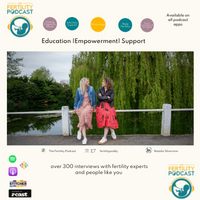The HFEA answers your questions on restarting fertility treatment
In this bonus episode,Kate and I speak with Sally Cheshire, who is the chair of the Human Fertilisation and Embryology Authority (HFEA)
These shownotes are a transcript of part of our conversation with Sally. Please listen to hear the full interview:
What is 'elective treatment'
It is the word that the NHS use when it's not an outright emergency. So the NHS made that decision. And it's an unfortunate name because no one chooses to go in for surgery, particularly with regard to fertility treatment, but that's the word that's been used.
So the NHS said that they would suspend all non-emergency treatment during the pandemic, so the only people who were being treated in the first stages of the pandemic after the 23rd of March, that was, were people who were in an emergency situation.
What we said in terms of fertility is that patients who were having cancer surgery, for example, and needed fertility preservation would still be allowed to go ahead and our clinics would stay open for those patients to store gametes and embryos. But also, we would allow as many patients as possible to try and finish their cycles if they had started. And we know that there was a different response from clinics, and you can imagine that they were trying to manage, as well as all other NHS hospitals, some clinics carried on with those cycles, and then collected eggs or frozen eggs or embryos. But some patients we know had their cycles cancelled earlier than the 15th of April. And all I have to say is it was up to the clinic to decide whether they could go ahead. Some of them of course, had already lost staff to the front line. They'd had some of their equipment used for testing for virus testing from the embryology lab, and some of them also had staff who were self isolating or who've been diagnosed.
Counselling:
We do know there's been a massive increase in patients seeking counselling support. But if you actually talk to counsellors, some patients are asking different questions. Some of them are clearly distressed, not being able to have treatment. Some of them are very fearful of the virus and what impact it might have. So counsellors tell us they've seen an increase in patients who were just seeking help to deal with their general anxiety, not necessarily ready to talk about the implications of their particular treatment and what that might mean. So we do know that there is support out there and I'm sorry to patients who didn't quite get what they wanted, perhaps from their clinic.
Professional Guidance:
We've had to rely on professional guidance. So from the UK bodies from the British fertility society and of and the clinical scientists, but also from Europe and America, who advised similarly to stop treatment, until we knew a few more things, and their guidance has been very similar to the UK all along. And the Royal College of Obstetricians and gynaecologists also had to think about whether they considered there was any risk in early pregnancy. And they've also issued a couple of sets of guidance. So I think everybody has issued at least two sets of guidance over the last four weeks from the professional bodies. We've issued a number of letters to clinics explaining our requirements. And we've also tried to communicate with patients as best we can.
The professional bodies have issued their latest guidance, which is cautious optimism.
Tough Decision:
I think this is the most difficult decision the FDA has ever had to make in 30 years really and the board and the staff have tried so hard to get it right. One of one of our criteria, quite rightly, was that there was no, or that there was as much evidence as possible to say there was no increased risk in pregnancy. And when I was thinking about it this morning, as a patient, you know, pregnancy is somewhere over the rainbow, isn't it? It's a long, long time away. And if you are trying to think about having treatment, it's probably not even possible in...
See acast.com/privacy for privacy and opt-out information.


